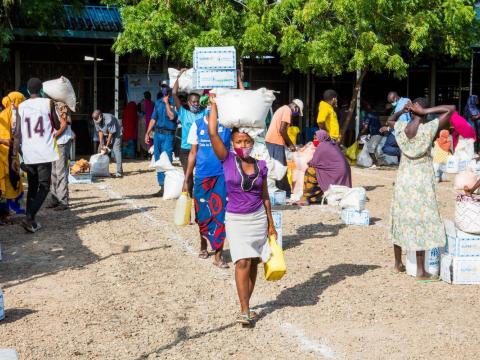
Food and (in)dignity
By Daniel Wang'ang'a
When I started working in development in my country, Kenya, nearly 30 years ago, we fed hungry people the best way we could. It saved lives, but it was painful at times.
What pained me most was the process people would go through to access food – walking for days, risking abuse, queuing up for hours and hours, hungry, no water, holding empty plates. As an African man, I struggled with this way of disbursing food. It eroded dignity.
Food is much more than a meal. Food is dignity. It is a commodity.
We – World Vision, our partners, the international humanitarian community – have learned so much in the years since.
Now, we use designated vouchers, in small denominations, meaning that when you go to a supermarket, you can pick the goods you and your family need today. With these vouchers, there can be restrictions on what you can buy, but you can choose where you shop.

Now, we use undesignated vouchers, so you can contribute to the local economy and make decisions about what and where you buy.
Now, we use cash, so you can buy anything you need, including from the local producer selling fresh, locally grown produce in a stall on the side of the road.
Now, we ensure no one who attends a food distribution has to come further than 5kms.
We know that when you say to people, here is an undesignated voucher or cash, they will spend it on what their family needs – medicine, food. They do not walk away from their hungry children and buy perfume!
We found out that it is critical to have a variety of items and variety of suppliers, so people don’t get tired of one supplier, or have to spend their vouchers buying from someone who offers sub-standard food and products. If people are not happy, they can go somewhere else – giving them choice, and encouraging market-based competition between suppliers.


We have seen cash and vouchers help to grow the local economy. Working with a lot of local suppliers means those with vouchers or cash have choice, and those providing goods have to continue to compete in an open market.
We learned, painfully, that cash can leave people vulnerable to abuse and extortion.
We learned about panic buying long before COVID-19. Sometimes with designated vouchers, everyone who has one rushes out to redeem their vouchers, in fear that things will run out. This, as we know, creates congestion, leads to shortages for all shoppers.
We realised there is always a time and place for food distributions, and in those times, we need access to large amounts of good-quality food fast. We learned to stockpile food in warehouses around the world. This approach saves lives.
Above all, we have learned how important it is that the recipients – of cash, of food, of vouchers – are empowered to make the decisions and choices about what they need. The argument that they won’t spend cash on what it’s intended for is paternalistic, outdated, and ignores the role of good monitoring and evaluation. You are saying my people cannot make decisions, they need to be controlled, they need to be helped. The research proves that this is simply not the case.
We have not finished learning, but we have come a long way.
Daniel Wang'ang'a leads World Vision’s Disaster Management technical team. Follow Daniel on Twitter @Wanganga_Daniel